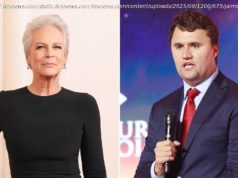One party to the first interracial kiss on U. S. television opposite William Shatner as James T. Kirk, Nichols is a pioneer in television.…
One party to the first interracial kiss on U. S. television opposite William Shatner as James T. Kirk, Nichols is a pioneer in television.
When Nichelle Nichols, portraying the perky and self-motivated Starfleet communications officer Lt. Uhura, smooched the captain of the Enterprise — William Shatner portraying the impetuous and impulsive Captain James Tiberius Kirk — in an episode of 1976 sci-fi staple “Star Trek”, it made the history books according to the Hollywood Reporter.
The episode in question, “Apollo’s Children” cast the crewmates together in embrace, and though spurred on through the plot device of alien mind control, the two lock lips in an affair that shocked comparatively conservative television audiences of the 1960s but laid the groundwork for a more inclusive understanding of romance both on-screen and off.
Now, news that Nichols has been under medical care for what is termed as “moderate progressive dementia” has been brought forward by TMZ, records having been attained as part of Nichols’ conservatorship. In the acquired documentation, Nichols’ physician — Dr. Meena Makhijani, a specialist in osteopathic treatment — said that Nichols had been a patient under her care for the past two to three years and had been dealing with the diagnosis in the interim.
In a touching memory shared by Nichols as to her plans to leave Star Trek in the midst of its run to pursue singing and dancing opportunities on Broadway, she recounts being approached by a notable historic figure who advised her against her plan to depart. In a chance meeting with Dr. Martin Luther King Jr., a man whom Nichols describes as “both attractive and a Trekker” according to The Guardian, she says that King not only advised her not to leave, but gently and jokingly suggested it was her duty to remain on the bridge of the Enterprise.
“He told me not only that I shouldn’t but I couldn’t leave… He knew more than I knew. He knew more about me, where I was going to in my life, than I did.”
Nichols would remain with her co-stars until the show was canceled a few scant years later, before the cult following that would later carry the show had sprung up. Her reasoning? That she should remain a public figure in popular fiction, a positive role model for millions of young women and children.
Nichelle Nichols has contributed greatly to the advancement of women and racial minorities in terms of the physical sciences, particularly space exploration, following her departure from the spotlight. Named a Governor of the National Space Society, and lauded for her contribution to the field and a growing interest thereof, Nichols has been a lifelong advocate for a more inclusive, more diverse future here on Earth or amongst the stars.





